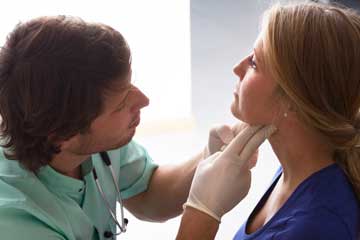
I’m sure you must have very commonly heard from people that they are suffering from Thyroid. So, what so exactly is this thyroid?
Well, thyroid is not the name of disease, but a very important hormonal gland present in your neck. Thyroxine is an important hormone produced by thyroid which is responsible for maintaining metabolism in our body. Both the excess and deficiency of this hormone can prove harmful for us and leads to a spectrum of problems.
Hypothyroidism
As the name suggest hypothyroidism is the type of thyroid disorder where thyroid gland is under-functioning. Hence there is a deficiency of thyroxine (T4) in your body. As a result overall metabolic rate is low.
It can be caused because of many reasons like
- Radiation therapy in neck region
- Lack on iodine in your diet
- Thyroid surgery
- Radioactive iodine treatment
- Use of medications like amiodarone, interferon alpha, lithium or interleukin-2
- Changes during pregnancy
- Disorders of hypothalamus or pituitary gland
- Congenital thyroid problems
- Primary Hypothyroidism caused by thyroid disorders
Hypothyroidism is more common in women.
Various symptoms of hypothyroidism are as follows:
- Alteration in the menstrual cycle
- Depression
- Constipation
- Changes in hair texture and increased hair loss
- Fatigue
- Dry skin
- Increased sensitivity to cold
- Goitre (Swelling in neck region due to thyroid enlargement)
- Slower heart rate
- Carpal tunnel syndrome
- Unexplained weight gain
The diagnosis of hypothyroidism is established on the basis of blood levels of TSH and T4.
T4 is decreased in hypothyroidism as discussed earlier. TSH levels are increased.
In some cases TSH levels may be increased but T4 levels are normal. This is called subclinical hypothyroidism and may indicate towards the earlier stage of hypothyroidism.
Treatment of hypothyroidism includes replacement of thyroxine using synthetic T4 supplements. Make sure you discuss all the medications, supplements or herbs you’re taking with your doctor as a lot of medications interfere with thyroxine hormone absorption. Doctor would advise you to regularly check the TSH (and T4 levels) and adjust the dosage accordingly.
Hyperthyroidism
In hyperthyroidism thyroid gland is over-functioning, thus produces more than required thyroxine hormone. Your doctor may refer to it as “overactive thyroid”.
Since thyoxine has a promoting effect on metabolism, overactive thyroid would ultimately lead to a higher metabolic rate.
Women have 5-10 times more chances of having hyperthyroidism.
Hyperthyroidism may be caused by many reasons like:
- Grave’s disease
- Thyroiditis
- Thyroid Nodule
- Excess Iodine
- Thyroid Medications
Various Symptoms of Hyperthyroidism are:
- Nervousness, Anxiety, and irritability
- Frequent, loose bowel movements
- Double vision
- Difficulty sleeping
- Exophthalmos (Proptosis) that is bulging or protruding eyes (common in Grave’s disease)
- Arrhythmia (Irregular heart beat) more common in older adults
- Hair problems like brittle hair, increased scalp hair loss and thinning hair
- Menstrual cycle problems like less frequent periods and lighter bleeding
- Muscle weakness, particularly in upper arms and thighs
- Enhanced fingernail growth
- Increased heartbeat, frequently over 100 beats/minute
- Trembling hands
- Excessive sweating
- Weight loss even with increased appetite
- Thinning skin
Diagnosis of Hyperthyroidism is established on the basis of blood tests: TSH and T4 levels. Thyroid-stimulating immunoglobin test can also be done to determine thyroid stimulating antibody for Grave’s disease. Once the diagnosis is established following tests are required to further determine the underlying disorder:
- Thyroid ultrasound for checking inflammation or nodules
- Radioactive Iodine uptake test for determining iodine absorption in thyroid
- Thyroid scan to check for iodine location on the thyroid
#Hypothyroidism versus #Hyperthyroidism: Thyroid problems You Must Know About
https://t.co/Dz7V33dupF
#health pic.twitter.com/yxjAG1r9hp
— Zigverve.com (@zigverve) November 24, 2015
Treatment of hyperthyroidism depends on the underlying cause along with other factors like overall health, age, and severity of symptoms. Various treatment options available are:
- Anti-thyroid drugs like methimazole or propylthiouracil. These drugs inhibit the thyroxine production. Though there is no permanent thyroid damage, there may be serious side effects of the drugs.
- Oral Radioactive Iodine: Hyperactive thyroid cells quickly takes up this iodine followed by their death. Thus, no more thyroxine is released after the treatment. However, this leaves the person with hypothyroid and will have to externally take thyroxine supplements for the rest of his/her life.
- Thyroidectomy: It is the surgical removal of entire or parts of thyroid. Once again this may leave the individuals with hypothyroid and would require life-long thyroxine supplements.
- Beta blockers: These drugs are used to lower the heart rate. They have no effect in lowering the thyroxine levels, however.
Now that you know the basics of thyroid problems, if a doctor says you’re suffering from thyroid, you should ask your doctor which kind.









There is a lot of difference. Thanks for explaining./
Yes, Indrani. Sadly, most people don’t know the difference. And, as you know, many Indians try to give free advice and even free medical advice without the actual knowledge. I have seen such incidence when a Hyperthyroidism patient was given Thyroxine by a relative thinking it was same as hypothyroidism. Such incidence could actually be very critical.